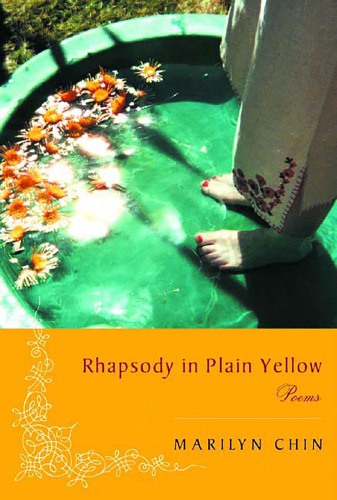
Rhapsody in Plain Yellow
Poems
کتاب های مرتبط
- اطلاعات
- نقد و بررسی
- دیدگاه کاربران
نقد و بررسی

October 22, 2001
Chin's concerns for heritage and descent, matched with confrontational rhetoric, seem to make her an old-school poet of Asian-American identity, while a liberal use of autobiographical material (her grandmother, her parents, her neighborhood, her lovers, her English department) positions her speaker as a representative witness to modern, multicultural, middle-class California. This third collection's jagged rhythms and fragmented forms, some based on Chinese poetry and music, others derived from blues and Persian ghazals, thus seem a small-scale syncretism of the personal and political. Chin can tear at familial wounds even while expressing dismay at the limits of tradition: "I, my mother's aging girl/ Myopic, goat-footed// Got snagged on an unmarked trail/ The road diverged; I took/ The one less traveled/ Blah, blah// I sit at her grave for hours...." In other elegies for her mother, and in the at times erotic title poem, Chin approaches the sinewy strength of Adrienne Rich. "Poetry is a vast orphanage in which you and I are stars," "Broken Chord Sequence" says; "One robe, one bowl, silent pilgrimage, the river filled with martyrs." One poem proclaims "The Colonial Language is English"; others promise musical idyll ("Summer Sonatina") or allegory ("The True Story of Mortar and Pestle"). Chin's ambitions can outrun her technique: some poems, especially those in short lines, lack aural or emotional power. Overall, though, this collection's speaker has a strong sense of herself and of her times—a sense to which readers of many concerns could respond.

April 15, 2003
No China doll, Chin is instead a "bold beauty" who describes the crossover from Eastern to Western culture in a forthright voice that's sometimes flippant and sometimes edged with anger.
Copyright 2003 Library Journal, LLC Used with permission.

January 1, 2002
Chin paces the line demarcated by the words " Chinese American "like a caged tiger, fury just barely held in check one moment, miasma rising dank and poisonous the next. "Blues on Yellow," a wily blues lyric about ethnicity and prejudice, sets the tone for this electrifying collection of protests and laments. Wielded to the axis of anger and reconciliation, Chin's powerful poems hold the knowledge that "there's no life on earth without pain" at their core as they draw everything into their orbit, from ancient Chinese philosophy and folktales to Aretha's hallelujah voice to the murmur of freeways. Impeccable form holds seething emotion as Chin remembers her parents and ponders death, love and aloneness, expectations and failings, exile and abandonment, and the suffering reserved specifically for women. She looks from East to West and back again, restless, critical, poised for flight or fight but persuaded by the muse to hold her ground and find the words for all that boils within and without, all that makes being human so urgent and confounding.(Reprinted with permission of Booklist, copyright 2002, American Library Association.)

























دیدگاه کاربران